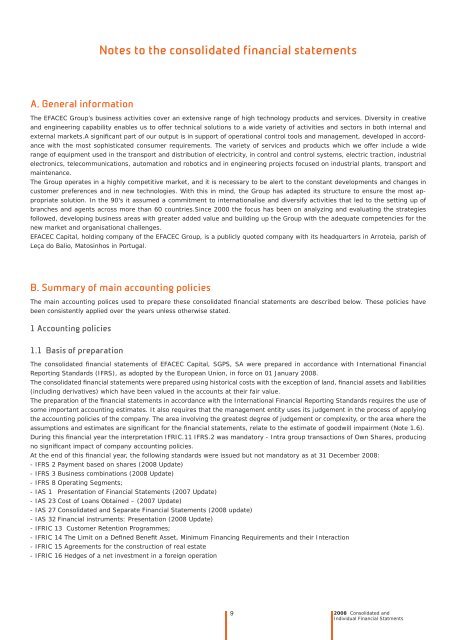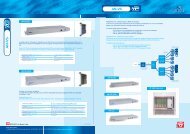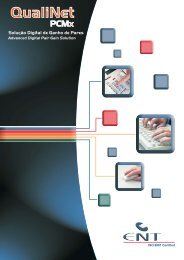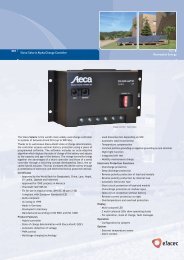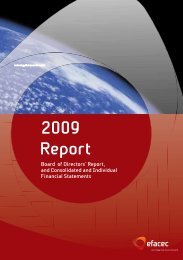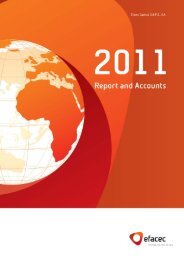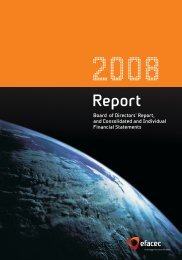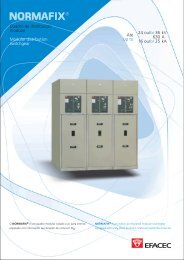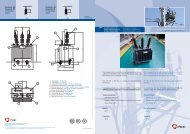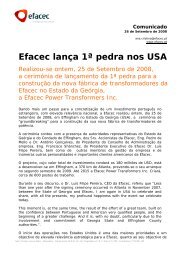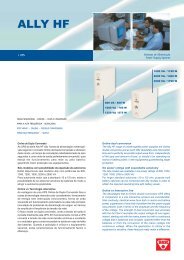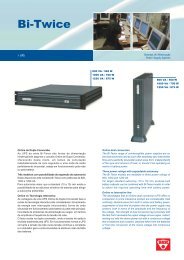Notes to the consolidated financial statements - Efacec
Notes to the consolidated financial statements - Efacec
Notes to the consolidated financial statements - Efacec
Create successful ePaper yourself
Turn your PDF publications into a flip-book with our unique Google optimized e-Paper software.
A. General information<br />
<strong>Notes</strong> <strong>to</strong> <strong>the</strong> <strong>consolidated</strong> <strong>financial</strong> <strong>statements</strong><br />
The EFACEC Group’s business activities cover an extensive range of high technology products and services. Diversity in creative<br />
and engineering capability enables us <strong>to</strong> offer technical solutions <strong>to</strong> a wide variety of activities and sec<strong>to</strong>rs in both internal and<br />
external markets.A signifi cant part of our output is in support of operational control <strong>to</strong>ols and management, developed in accordance<br />
with <strong>the</strong> most sophisticated consumer requirements. The variety of services and products which we offer include a wide<br />
range of equipment used in <strong>the</strong> transport and distribution of electricity, in control and control systems, electric traction, industrial<br />
electronics, telecommunications, au<strong>to</strong>mation and robotics and in engineering projects focused on industrial plants, transport and<br />
maintenance.<br />
The Group operates in a highly competitive market, and it is necessary <strong>to</strong> be alert <strong>to</strong> <strong>the</strong> constant developments and changes in<br />
cus<strong>to</strong>mer preferences and in new technologies. With this in mind, <strong>the</strong> Group has adapted its structure <strong>to</strong> ensure <strong>the</strong> most appropriate<br />
solution. In <strong>the</strong> 90's it assumed a commitment <strong>to</strong> internationalise and diversify activities that led <strong>to</strong> <strong>the</strong> setting up of<br />
branches and agents across more than 60 countries.Since 2000 <strong>the</strong> focus has been on analyzing and evaluating <strong>the</strong> strategies<br />
followed, developing business areas with greater added value and building up <strong>the</strong> Group with <strong>the</strong> adequate competencies for <strong>the</strong><br />
new market and organisational challenges.<br />
EFACEC Capital, holding company of <strong>the</strong> EFACEC Group, is a publicly quoted company with its headquarters in Arroteia, parish of<br />
Leça do Balio, Ma<strong>to</strong>sinhos in Portugal.<br />
B. Summary of main accounting policies<br />
The main accounting polices used <strong>to</strong> prepare <strong>the</strong>se <strong>consolidated</strong> fi nancial <strong>statements</strong> are described below. These policies have<br />
been consistently applied over <strong>the</strong> years unless o<strong>the</strong>rwise stated.<br />
1 Accounting policies<br />
1.1 Basis of preparation<br />
The <strong>consolidated</strong> fi nancial <strong>statements</strong> of EFACEC Capital, SGPS, SA were prepared in accordance with International Financial<br />
Reporting Standards (IFRS), as adopted by <strong>the</strong> European Union, in force on 01 January 2008.<br />
The <strong>consolidated</strong> fi nancial <strong>statements</strong> were prepared using his<strong>to</strong>rical costs with <strong>the</strong> exception of land, fi nancial assets and liabilities<br />
(including derivatives) which have been valued in <strong>the</strong> accounts at <strong>the</strong>ir fair value.<br />
The preparation of <strong>the</strong> fi nancial <strong>statements</strong> in accordance with <strong>the</strong> International Financial Reporting Standards requires <strong>the</strong> use of<br />
some important accounting estimates. It also requires that <strong>the</strong> management entity uses its judgement in <strong>the</strong> process of applying<br />
<strong>the</strong> accounting policies of <strong>the</strong> company. The area involving <strong>the</strong> greatest degree of judgement or complexity, or <strong>the</strong> area where <strong>the</strong><br />
assumptions and estimates are signifi cant for <strong>the</strong> fi nancial <strong>statements</strong>, relate <strong>to</strong> <strong>the</strong> estimate of goodwill impairment (Note 1.6).<br />
During this fi nancial year <strong>the</strong> interpretation IFRIC.11 IFRS.2 was manda<strong>to</strong>ry - Intra group transactions of Own Shares, producing<br />
no signifi cant impact of company accounting policies.<br />
At <strong>the</strong> end of this fi nancial year, <strong>the</strong> following standards were issued but not manda<strong>to</strong>ry as at 31 December 2008:<br />
- IFRS 2 Payment based on shares (2008 Update)<br />
- IFRS 3 Business combinations (2008 Update)<br />
- IFRS 8 Operating Segments;<br />
- IAS 1 Presentation of Financial Statements (2007 Update)<br />
- IAS 23 Cost of Loans Obtained – (2007 Update)<br />
- IAS 27 Consolidated and Separate Financial Statements (2008 update)<br />
- IAS 32 Financial instruments: Presentation (2008 Update)<br />
- IFRIC 13 Cus<strong>to</strong>mer Retention Programmes;<br />
- IFRIC 14 The Limit on a Defi ned Benefi t Asset, Minimum Financing Requirements and <strong>the</strong>ir Interaction<br />
- IFRIC 15 Agreements for <strong>the</strong> construction of real estate<br />
- IFRIC 16 Hedges of a net investment in a foreign operation<br />
9<br />
2008 Consolidated and<br />
Individual Financial Statments


